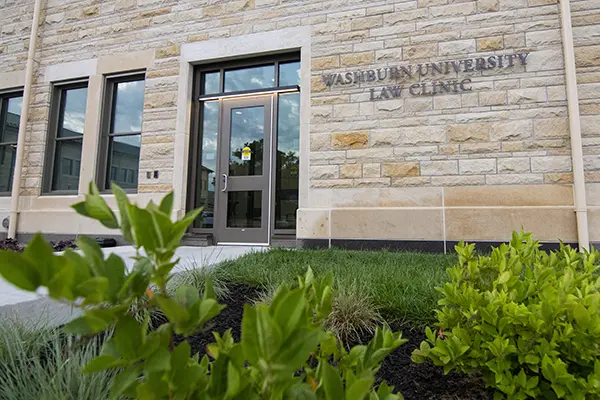Juris Doctor


Washburn Law's first-year program gives you a meaningful start on your legal education, covering the essential principles and skills of legal practice and providing a solid foundation for the following years of law school.
After gaining the necessary foundation and skills in their first year, students enjoy a robust curriculum and the chance to delve into a diverse array of subjects. In addition to meeting upper-level requirements, we encourage you to tailor your legal study to align with your unique interests, and many of our students go on to add a specific focus by participating in one of certificate programs or our clinical and externship placements. You can also take advantage of our signature Centers for Excellence in advocacy, business and transactional law, children and family law, international and comparative law, intellectual property and technology law, oil and gas law, and law and government.
Washburn Law recognizes that there are many different paths into and out of law school. To provide its graduates with the maximum flexibility for career options, Washburn Law has carefully designed its first-year and upper-level curriculum, including its requirements and electives, to ensure that graduates from its juris doctor program achieve and exceed the ABA mandated learning outcomes. Upon graduation from Washburn Law:
The Washburn Law curriculum is designed to enable graduates to successfully participate in the professional environment that most juris doctors aspire to work in as practicing lawyers or as professionals in other disciplines.
Washburn Law has partnered with Washburn University to offer four versatile dual degree options. Students wanting to distinguish themselves with advanced training can earn their JD degree while also obtaining a master's degree through the School of Business or the School of Applied Studies. These degree options include

Washburn Law has developed a extensive academic support program to help you maximize your potential for success in law school, on the bar exam, and in law practice. Incoming students take advantage of this program by attending our rigorous first-week program where they learn the strategies to develop the skills needed for academic success throughout law school. Once the academic year begins, students participate in our small group mentoring program and our nationally recognized legal research and writing program. They also have access to academic fellows who offer academic support and guidance.
In addition, Washburn Law understands that bar exam preparation begins the first year of law school so students now have access to BARBRI materials starting their first semester. BARBRI, known as the leader in bar preparation programs, offers a range of supplemental resources to aid in law school courses, and each Washburn Law student receives these as part of the cost of attendance.
Students in the Washburn Law Clinic gain real-world practice experience under the supportive supervision of our clinic faculty while make a difference in their community by helping those who would otherwise be unable to afford an attorney.
As part of the clinic experience, students have the opportunity to apply the educational foundations and legal knowledge gained in their other law classes in a professional and practical learning environment by representing real clients in real cases. Students are not merely law clerks performing support work; but rather, the Washburn Law clinical program is structured so that students have primary responsibility for their clients' cases
Washburn Law offers clinical experience through the Law Clinic in civil practice, criminal defense, family justice and immigration and small business and nonprofit transactional law. In addition, students can also gain real-world client experience in criminal appellate advocacy and income tax assistance through other school programs.
Washburn Law Clinic

Washburn Law is proud to offer the innovative Third Year Anywhere® program, the first of its kind, providing an unparalleled opportunity for students to compete their final year of law school in the geographic area where they plan to practice after graduation. This program is perfect for those who want to gain real-world experience while not being confined to Topeka or even Kansas.
Students participating in Third Year Anywhere® extern 20 hours per week in sectors such as corporate, government, higher education, judicial, law firm, public interest, or even rural locations where attorneys are scarce. This immersive experience allows students to earn credit while enhancing their practice-readiness and gaining significant legal work experience. In addition to gaining this practical experience, students can study where they intend to take the bar exam, interview for jobs in their chosen market, and even earn income from paid placements.